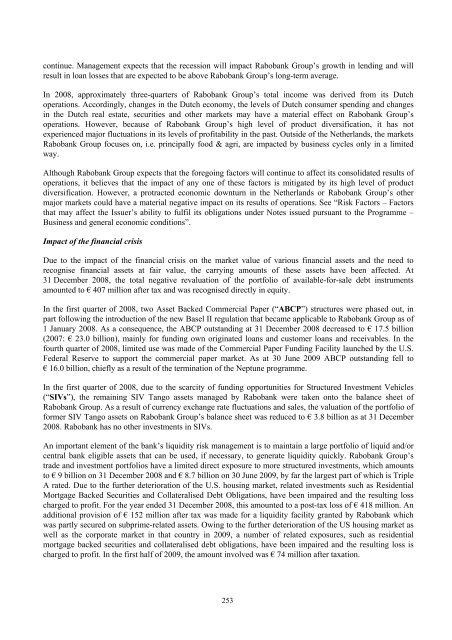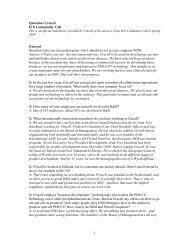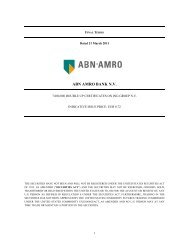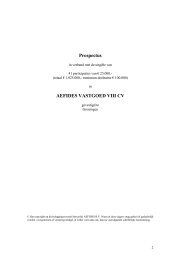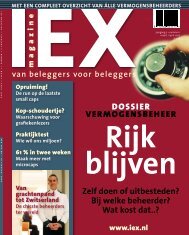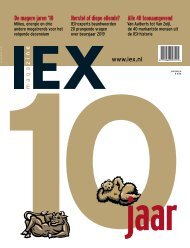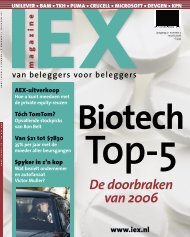Dit prospectus is gemaakt voor de uitgifte van dit product en ... - Iex
Dit prospectus is gemaakt voor de uitgifte van dit product en ... - Iex
Dit prospectus is gemaakt voor de uitgifte van dit product en ... - Iex
Create successful ePaper yourself
Turn your PDF publications into a flip-book with our unique Google optimized e-Paper software.
continue. Managem<strong>en</strong>t expects that the recession will impact Rabobank Group’s growth in l<strong>en</strong>ding and willresult in loan losses that are expected to be above Rabobank Group’s long-term average.In 2008, approximately three-quarters of Rabobank Group’s total income was <strong>de</strong>rived from its Dutchoperations. Accordingly, changes in the Dutch economy, the levels of Dutch consumer sp<strong>en</strong>ding and changesin the Dutch real estate, securities and other markets may have a material effect on Rabobank Group’soperations. However, because of Rabobank Group’s high level of <strong>product</strong> diversification, it has notexperi<strong>en</strong>ced major fluctuations in its levels of profitability in the past. Outsi<strong>de</strong> of the Netherlands, the marketsRabobank Group focuses on, i.e. principally food & agri, are impacted by business cycles only in a limitedway.Although Rabobank Group expects that the foregoing factors will continue to affect its consolidated results ofoperations, it believes that the impact of any one of these factors <strong>is</strong> mitigated by its high level of <strong>product</strong>diversification. However, a protracted economic downturn in the Netherlands or Rabobank Group’s othermajor markets could have a material negative impact on its results of operations. See “R<strong>is</strong>k Factors – Factorsthat may affect the Issuer’s ability to fulfil its obligations un<strong>de</strong>r Notes <strong>is</strong>sued pursuant to the Programme –Business and g<strong>en</strong>eral economic con<strong>dit</strong>ions”.Impact of the financial cr<strong>is</strong><strong>is</strong>Due to the impact of the financial cr<strong>is</strong><strong>is</strong> on the market value of various financial assets and the need torecogn<strong>is</strong>e financial assets at fair value, the carrying amounts of these assets have be<strong>en</strong> affected. At31 December 2008, the total negative revaluation of the portfolio of available-for-sale <strong>de</strong>bt instrum<strong>en</strong>tsamounted to € 407 million after tax and was recogn<strong>is</strong>ed directly in equity.In the first quarter of 2008, two Asset Backed Commercial Paper (“ABCP”) structures were phased out, inpart following the introduction of the new Basel II regulation that became applicable to Rabobank Group as of1 January 2008. As a consequ<strong>en</strong>ce, the ABCP outstanding at 31 December 2008 <strong>de</strong>creased to € 17.5 billion(2007: € 23.0 billion), mainly for funding own originated loans and customer loans and receivables. In thefourth quarter of 2008, limited use was ma<strong>de</strong> of the Commercial Paper Funding Facility launched by the U.S.Fe<strong>de</strong>ral Reserve to support the commercial paper market. As at 30 June 2009 ABCP outstanding fell to€ 16.0 billion, chiefly as a result of the termination of the Neptune programme.In the first quarter of 2008, due to the scarcity of funding opportunities for Structured Investm<strong>en</strong>t Vehicles(“SIVs”), the remaining SIV Tango assets managed by Rabobank were tak<strong>en</strong> onto the balance sheet ofRabobank Group. As a result of curr<strong>en</strong>cy exchange rate fluctuations and sales, the valuation of the portfolio offormer SIV Tango assets on Rabobank Group’s balance sheet was reduced to € 3.8 billion as at 31 December2008. Rabobank has no other investm<strong>en</strong>ts in SIVs.An important elem<strong>en</strong>t of the bank’s liqui<strong>dit</strong>y r<strong>is</strong>k managem<strong>en</strong>t <strong>is</strong> to maintain a large portfolio of liquid and/orc<strong>en</strong>tral bank eligible assets that can be used, if necessary, to g<strong>en</strong>erate liqui<strong>dit</strong>y quickly. Rabobank Group’stra<strong>de</strong> and investm<strong>en</strong>t portfolios have a limited direct exposure to more structured investm<strong>en</strong>ts, which amountsto € 9 billion on 31 December 2008 and € 8.7 billion on 30 June 2009, by far the largest part of which <strong>is</strong> TripleA rated. Due to the further <strong>de</strong>terioration of the U.S. housing market, related investm<strong>en</strong>ts such as Resi<strong>de</strong>ntialMortgage Backed Securities and Collateral<strong>is</strong>ed Debt Obligations, have be<strong>en</strong> impaired and the resulting losscharged to profit. For the year <strong>en</strong><strong>de</strong>d 31 December 2008, th<strong>is</strong> amounted to a post-tax loss of € 418 million. Anad<strong>dit</strong>ional prov<strong>is</strong>ion of € 152 million after tax was ma<strong>de</strong> for a liqui<strong>dit</strong>y facility granted by Rabobank whichwas partly secured on subprime-related assets. Owing to the further <strong>de</strong>terioration of the US housing market aswell as the corporate market in that country in 2009, a number of related exposures, such as resi<strong>de</strong>ntialmortgage backed securities and collateral<strong>is</strong>ed <strong>de</strong>bt obligations, have be<strong>en</strong> impaired and the resulting loss <strong>is</strong>charged to profit. In the first half of 2009, the amount involved was € 74 million after taxation.253


